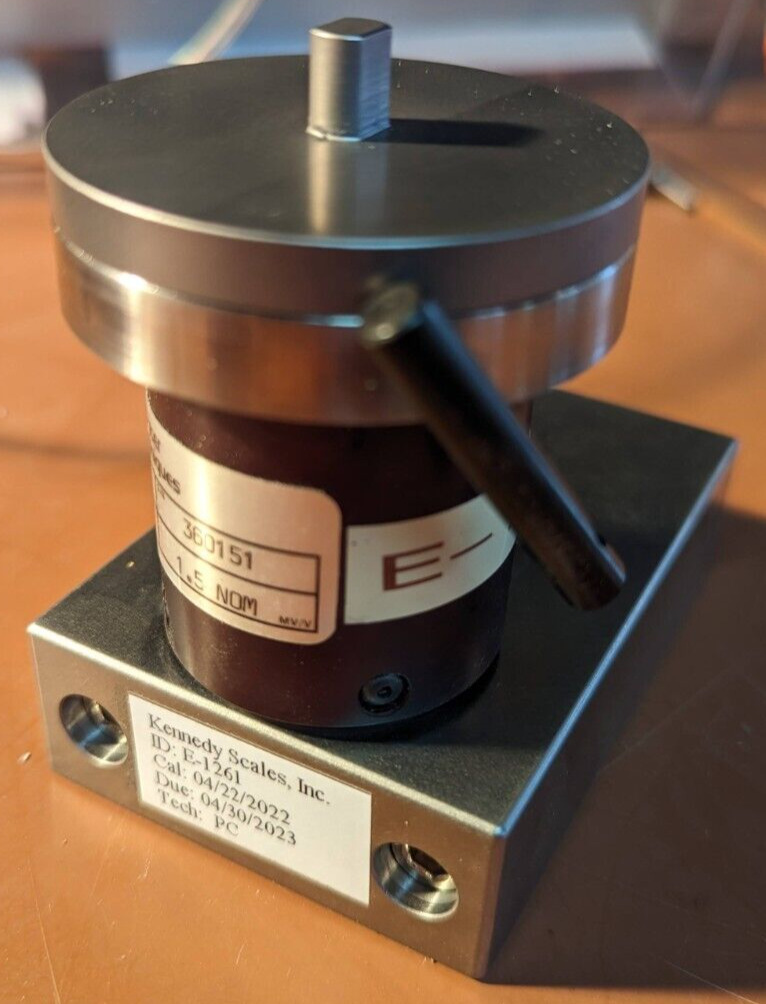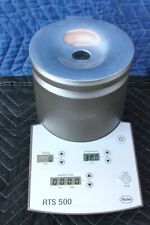
RTS-500 Reaction Torque Sensor 500 in-oz. Transducer Techniques w/ fixture For Sale

When you click on links to various merchants on this site and make a purchase, this can result in this site earning a commission. Affiliate programs and affiliations include, but are not limited to, the eBay Partner Network.
RTS-500 Reaction Torque Sensor 500 in-oz. Transducer Techniques w/ fixture:
$700.00
Includes fixture components and cable.Last calibrated 4/22/2022 by Kennedy ScalesRTS-500 Reaction Torque Sensors Was Designed To Fill The Need For Accurate Torque MeasurementsThe RTS-500 torque sensor was designed to fill the need for accurate torque measurements below 62.5 in.lbs. without giving up stiffness or sensitivity to forces from other directions. They are manufactured from sensor quality aluminum and anodized for long term durability. Bonded foil strain gagues and materials of the highest quality are installed assuring high reliability. The four bolt hole pattern with the use of our O.D. or I.D. pilots on either end allows simple adaptation to any application. RTS-500 Capacity Range: 0- 500 in-oz.
RTS Series Torque Sensor Applications
The Transducer Techniques RTS Series torque sensors are versatile instruments designed to accurately measure torque in a variety of applications. Their unique combination of features makes them suitable for a range of torque measurement needs. Here are some applications where the RTS Series torque sensors can be effectively utilized: Automotive Testing: In the automotive industry, RTS Series torque sensors can be used to measure torque during engine assembly, component testing, and quality control processes. They ensure that fasteners are tightened to the correct specifications, preventing over-tightening or under-tightening. Manufacturing and Assembly: These torque sensors are valuable in manufacturing and assembly lines, where torque-sensitive components are assembled, such as electronic devices, medical equipment, and consumer products. They help maintain product quality and consistency. Aerospace and Aviation: In the aerospace sector, RTS Series torque sensors play a critical role in the assembly and maintenance of aircraft components and systems. They ensure that fasteners on aircraft engines, wings, and other critical parts are tightened accurately. Research and Development: Researchers and engineers can use these torque sensors in various R&D applications, such as testing the torque characteristics of materials, prototypes, and mechanical components. They are essential for designing and improving products. Quality Control: The RTS Series sensors are ideal for quality control processes across industries, including electronics, manufacturing, and aerospace. They help verify that products meet torque-related specifications and standards. Material Testing: In material testing applications, torque sensors are used to measure the mechanical properties of materials, including their torsional strength and behavior under various torque loads. Medical Devices: In the medical device industry, torque sensors are utilized for the assembly and testing of medical instruments, ensuring that components are securely fastened and meet regulatory requirements. Automation and Robotics: Torque sensors can be integrated into automated systems and robotic arms to provide response on the torque applied during tasks such as screwing, gripping, and manipulating objects. Calibration and Instrumentation: The RTS Series torque sensors can serve as reference standards for calibrating other torque measurement devices and instrumentation, ensuring their accuracy and reliability. Product Development: Engineers and product designers use torque sensors during the development and testing of new products to understand how components interact under different torque loads. This information is crucial for optimizing designs. Educational and Training: Educational institutions and training facilities use torque sensors to teach students about torque principles, measurement techniques, and their real-world applications. The RTS Series torque sensors are known for their stiffness, sensitivity, and durability, making them suitable for precise torque measurements in a wide range of industries and research fields. Their adaptability and compatibility with different applications make them valuable tools for engineers, researchers, and quality control professionals.
What is a Torque Sensor?
A torque sensor, also known as a torque transducer or torque meter, is a specialized instrument designed to measure the torque or rotational force applied to an object. Torque sensors are used to quantify the amount of twisting or turning force exerted on a shaft, component, or assembly. They are essential in various applications where accurate torque measurement is crucial. Here are key characteristics and functions of torque sensors: Torque Measurement: The primary function of a torque sensor is to measure the amount of torque or rotational force applied to an object. Torque is typically expressed in units such as Newton-meters (N·m) or foot- pounds (ft-lb). Transduction Principle: Torque sensors utilize various transduction principles to convert mechanical torque into an electrical signal. Common transduction methods include strain gauges, piezoelectric crystals, capacitive sensing, and magnetic field variations. Installation: Torque sensors can be integrated into a wide range of systems and applications. They are often installed in- line with rotating components or between a drive source and the object being torqued. The sensor registers the twisting force as the object rotates. Non-Intrusive and Intrusive: Torque sensors come in both non-intrusive and intrusive forms. Non-intrusive sensors are placed around a rotating shaft without direct contact, while intrusive sensors involve direct contact with the shaft or component. Accuracy and Precision: High-quality torque sensors provide accurate and precise measurements, ensuring that torque values are reliable and repeatable. Calibration is essential to maintain accuracy. Signal Output: Torque sensors generate electrical output signals that represent the measured torque. These signals are typically analog (voltage or current) or digital and require further processing, conditioning, or amplification. Calibration: Torque sensors undergo calibration to establish a linear relationship between the applied torque and the output signal. Calibration ensures accurate torque measurements over the sensor's specified range. Applications: Torque sensors have a wide range of applications across various industries, including: Automotive: Torque sensors are used in engine testing, transmission testing, and quality control processes to ensure proper tightening of bolts and fasteners. Manufacturing: In manufacturing and assembly lines, torque sensors help maintain product quality by ensuring that components are assembled with the correct torque. Aerospace: The aerospace industry relies on torque sensors for assembling and maintaining aircraft components and systems. Material Testing: In material testing, torque sensors are used to measure the torsional properties of materials and components. Research and Development: Researchers use torque sensors to study the behavior of materials, prototypes, and mechanical systems under different torque loads. Robotics: Torque sensors are integrated into robotic arms and automation systems to provide response on applied torque during tasks. Calibration and Instrumentation: Torque sensors serve as reference standards for calibrating other torque measurement devices and instruments. Types of Torque Sensors: There are various types of torque sensors, including reaction torque sensors, rotary torque sensors, and static torque sensors, each designed for specific measurement needs. Torque sensors are vital tools for engineers, researchers, and professionals working in industries where precise torque measurement is essential for quality control, safety, and performance optimization. They help ensure that products and systems operate within specified torque limits and provide valuable data for analysis and improvement.

Related Items:
RTS-500 Reaction Torque Sensor 500 in-oz. Transducer Techniques w/ fixture
$700.00
Roche Rapid Translation System RTS 500
$99.00

